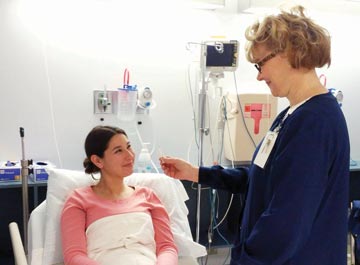If you want to start a nasal decolonization program, you must first choose a nasal sanitizer: either pre-moistened, ready-to-use povidone-iodine swabsticks that look like Q-tips or a single-use ampule shaped like a tube of lip balm that combines ethanol with emollients. Next, you must decide whether you’ll swab the nostrils of all your patients an hour or so before surgery, or just decolonize the nares of those patients getting any type of implant: mesh, biological or hardware.
Regardless of the product and patients you choose, by joining the growing number of surgical facilities that have found nasal decolonization to be a simple and inexpensive way to deactivate the germs that are present in every person’s nasal passages, you’ll help stop the spread of nasal MRSA without contributing to antibiotic resistance, which is nothing to sneeze at. Research shows that one-third of the general population is colonized with nasal Staphylococcus aureus, and that 80% of surgical site infections are caused by bacteria that originates in the nose.
“Nasal decolonization is a simple, low-cost way to help reduce infection risk, and patients seem to understand and not mind at all,” says Teresa M. Salley, RN, MS, MSN, perioperative manager at Sycamore Hospital in Miamisburg, Ohio.
We reached out to OR managers who’ve made nasal antisepsis a part of their SSI prevention bundle for pointers on doing so successfully. Here’s what they had to say.
1. Should you decolonize all patients? Some experts believe you should swab all patients with a skin incision; others say it’s better to reserve nasal antisepsis for select patients undergoing procedures with higher risks of infection.
One facility swabs a list of patients provided by infection prevention, including all spine, joint replacement, transplant and bowel patients. Another only decolonizes those patients who screen positive for MRSA or MSSA. “Anyone receiving an implant,” is the criteria for Maureen May, RN, BSN, director of surgical services at Ascension St. Vincent Carmel and Fishers in Indiana. Nasal swabbing is reserved for joint, heart and spine patients at Advocate Good Shepherd Hospital in Barrington, Ill., says perioperative educator Sharon Dillon, BSN, MPA, CNOR. Houston Methodist Hospital in Baytown, Texas, will begin using nasal sanitizing swabs on joint replacement patients in response to a recent spate of MRSA infections, says clinical resource nurse Kathleen Vandenbout, BSN, RN, BC, CAPA.
Others say you should make nasal swabbing a universal procedure. “It’s easier if you do all patients,” says a facility leader. “Make it a universal procedure so that all patients receive swabs.”
.svg?sfvrsn=be606e78_3)

.svg?sfvrsn=56b2f850_5)